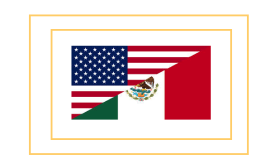mexico
When Marie Antoinette wanted to escape the confines and pressures of courtly life, she retreated to her quaint Petit Hameau where she and her companions donned their finest peasant frocks and pretended to be poor. A century later, fashionable Londoners took that pauper fantasy to a new extreme -- nocturnally touring East London's slums, where they gawked at ladies of the night and coined the phrase "slumming it."

On November 9, the website for the U.S.-Mexico Network at USC went live in conjunction with an event featuring Hillary Rodham Clinton.
Members of Mexico's drug cartels are really starting to harness the power of the internet, using it to run positive PR campaigns, post selfies with their pistols, and hunt down targets by tracking their movements on social media. Antoine Nouvet from the SecDev Foundation, a Canadian research organization, has been working with drug policy think-tank the Igarapé Institute on a project called the Open Empowerment Initiative.
Earlier this week, Germany’s Der Spiegel reported the latest leak of confidential documents from former National Security Agency (NSA) contractor Edward Snowden. According to these reports, the NSA monitored former Mexican president Felipe Calderón’s e-mail account and personal communications, gaining insight into Mexico’s political system and internal stability.
A report citing documents from National Security Agency leaker Edward Snowden says the U.S. gained access to the e-mail system of former Mexican president Felipe Calderon. The German newspaper Der Spiegel cited the Snowden documents in a story posted Sunday. Der Spiegel says the documents describe an operation dubbed “Flat liquid” that claim to have accessed Mexico’s “presidencia” domain, which was also purportedly used by members of Calderon’s Cabinet.
The Mexican oil industry, long a state monopoly, appears to be on the verge of opening itself to outsiders. In August, Mexican President Enrique Peña Nieto presented a proposal to allow national oil company Petróleos Mexicanos, or Pemex, to enter into joint ventures, and for private oil companies to operate their own projects in profit-sharing agreements with the government. Mexico's opposition parties have their own proposals.
Mexico, whose economic woes have pushed millions of people north, is increasingly becoming an immigrant destination. The country’s documented foreign-born population nearly doubled between 2000 and 2010, and officials now say the pace is accelerating as broad changes in the global economy create new dynamics of migration.
The mothers, holding the small hands of their children, can go only as far as the glass door, where Mexico ends and America begins. They lean down and send off their little ones with a kiss and a silent prayer. The children file into the U.S. port of entry, chatting in Spanish as they pull U.S. birth certificates covered in protective plastic from Barbie and SpongeBob backpacks. Armed U.S. border officers wave them onto American soil and the yellow buses waiting to take them to school in Luna County, N.M.







